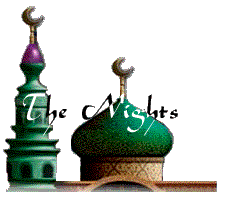

Unit 9

English 203:
Literature of the NonWestern World
 |

Unit 9 |

English 203: Literature of the NonWestern World |
| Introduction | .Explication | Questions | Review |
Introduction:
Reading:
The
1,001 Nights, 923-48;
Naguib Mahfouz, "Zaabalawi," 2881-93.
1,001 Nights:
This is something of a unique work because it was revised or rewritten by 3 very different cultures over a 1,000 year period. Our text says the text was "translated or adapted from Sanskrit in the time of the Sassanids (226-652 c.e.). So the first text was Hindu (Indian). The second text was Persian & it was written before the influence of Islam. This is obvious because of the sexual motives & sexual ambiance in the stories. Our text says that the stories are "still occasionally banned as immoral by Arab [i.e., Islamic] governments -- most recently by Egypt in 1989" (923). In the 9th & 10th centuries, after Islam had changed in midEast culture, the stories were translated into Arabic & the dramatic location was changed to Baghdad.
Our text is a selection from a work "based on the 13th c. Syrian manuscript . . . completed only in 1984" (924). For the most part, it illustrates a pre-Islamic outlook, although there are obvious Muslim revisions & interjections.
The theme of the story is as old as Gilgamesh: how do we temper power & make the powerful sensitive to the lives of those who do not have power? This is easily construed (in Homer, e.g.) as men learning to appreciate women & the civilization they produce. It is also the universal story of human growth & development. Young children rebel against total parental control, wanting a measure of power for themselves. Only after acquiring power (& a sense of personal identity & responsibility) can a child begin to respect & empathize with others. Our king, Shahrayar, is a child who has gained power & who is frustrated & enraged to learn (like Achilles) that power cannot compel love & loyalty. "Women are not to be trusted," Shahzaman says, before "he drew his sword & struck both his wife & the cook" (926). You do not have to be Sigmund Freud to recognize how violence & destruction are sexually fueled in the fearful child's hope to escape vulnerability. We also recognize how morality is similarly used in the futile process of denial: only women (or adults) have sexual needs & desires. I am both all powerful (complete in myself or by myself) & too moral to have such feelings. If they appear, violently destroy or repress them. You should notice how childish or child-like the brothers are. When Shahzaman relates the story of his wife's strange ritual adultery, Shahrayar -- like a child -- says: "In my opinion, what happened to you has never happened to anyone else. By God, had I been in your place, I would have killed at least a hundred or even a thousand women" (929). You see here the naiveté of the prepubescent child. You see the violent response that voices both denial & moral outrage (more naiveté). & you see that empathy has not yet developed in the king who blames all women for treachery & nasty, unthinkable sexuality.
You will recall that The Epic of Gilgamesh split the process of maturation into something like a sibling stage, between Gilgamesh & Enkidu, & a pubescent stage represented by Enkidu's involvement with a temple prostitute. Here the process of growing up takes a more abstract & elegant form: teasing, dalliance & love instruction from Shahrazad, made all the more tantric by the threat of bondage, whipping, & execution.
Zaabalawi:
Naguib Mahfouz's story is about Sufism. I hear many of you asking, what is that? Sufism is the adoption of Hindu bhakti, reoriented toward Allah. Sufism developed for 2 or 3 major reasons:
Sufism must work, if Mahfouz advocates it. The end of the story confirms that it does: "the universe moved in a rapture of ecstasy" (2892). On the other hand, we cannot possess the divine & the narrator continues to live in our familiar world of money & power. Still he is better off than he was & better off than almost everyone else: "How many weary people in this life know him not or regard him as a mere myth!" (2893).
Click on the next section:
| Explication |